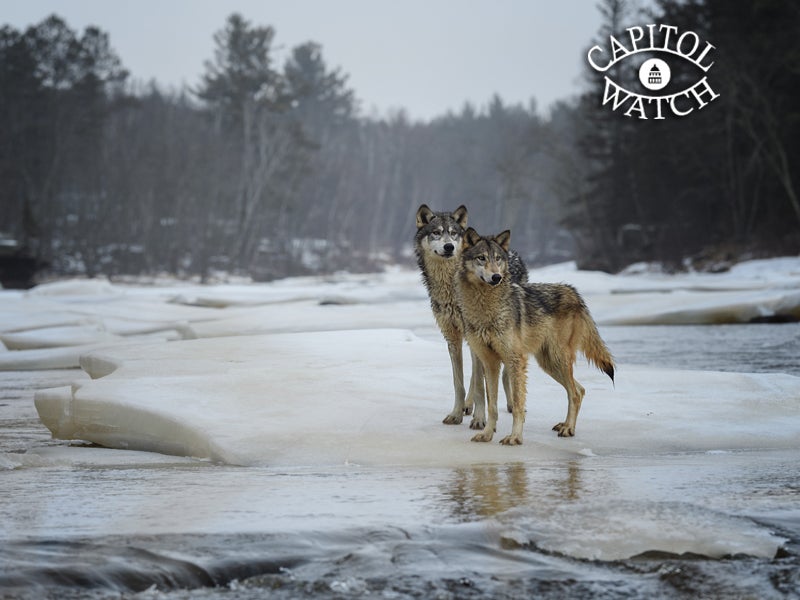The War on Wolves Act Threatens More than Just Wolves
Legislation introduced in the House and Senate would strip protections from wolves in four states—and take away citizens’ ability to challenge that decision.

This page was published 9 years ago. Find the latest on Earthjustice’s work.
Just over a month into its new session, the 115th Congress has already taken a sledgehammer to environmental safeguards that protect people, wildlife and wild lands from pollution and other harms. Besides moving to roll back protections for clean air and pristine mountain streams, as well as attacking government agencies’ ability to do their jobs and enforce the law, Congress is resurfacing its old grudge against gray wolves, while also clandestinely erecting a barrier to Americans’ ability to take their government to court.
Legislation introduced in both the House (H.R. 424) and Senate (S. 164), aptly described as the “War on Wolves Act,” would strip federal Endangered Species Act protections from gray wolves in Wyoming and three western Great Lakes states. Compounding the harm caused by delisting, this bill includes a provision that would make it impossible for people to challenge the decision in court, effectively stripping away Americans’ democratic right to hold their government accountable. (Samantha Bee tore into this misguided legislation and other attempts by Congress to make it easier to kill wildlife on her show “Full Frontal with Samantha Bee” last week. Warning: spicy language.)
Compounding the harm caused by delisting, this bill includes a provision that would make it impossible for people to challenge the decision in court, effectively stripping away Americans’ democratic right to hold their government accountable.
We’ve seen this play before. The 114th Congress also tried to use legislative edict to override the Endangered Species Act and take protections away from wolves in Wyoming, Michigan, Minnesota and Wisconsin, despite the fact that two federal courts found those states’ wolf management plans illegal under the act. In 2011, Congress succeeded in using this “legislative delisting” tactic to remove federal protections from wolves in Montana and Idaho. Since then, a conservative estimate of the number of wolves gunned down, trapped and poisoned in those states stands at roughly 2,500. When the state controlled its own wolf population between 2011 and 2013, Wyoming—arguably the state most hostile to wolves of the four—employed a “kill-on-sight” policy for wolves in 85 percent of the state and allowed one wolf-killing loophole after another in the rest. Victims of this terrible Wyoming policy include the most famous wolf in Yellowstone, known as the 06 female, who roamed outside the park and fell prey to a hunter waiting not far beyond the park’s invisible boundaries.
Following an Earthjustice lawsuit, in 2014 a federal court found Wyoming’s wolf management plan illegal and returned wolves in that state to the federal endangered species list. In another lawsuit, brought by the Humane Society of the United States, a judge also turned management of wolves in Wisconsin, Michigan and Minnesota back over to federal oversight.
Both of these court decisions are being appealed by state governments. It would be prudent for Congress to allow the cases to play out in court and not overstep its bounds by trampling on work being undertaken by the judiciary. But apparently, wolf opponents don’t feel comfortable relying on their arguments in court. Instead, they seek to force delisting by legislative fiat—regardless of whether the court might deem it illegal under our nation’s fundamental legal protection for imperiled wildlife: the Endangered Species Act.
The point is not to keep wolves listed forever under the act. If Wyoming would improve its management plan to provide an adequate legal safety net for wolves, then the wolves in Wyoming could be delisted. To date, however, the state has refused to do so. Instead, Wyoming is asking Congress to grant it the right to enact the same lethal hunting practices of the early 20th century that nearly drove gray wolves to extinction in the first place. That Congress would expose this species, which taxpayers have spent millions of dollars to recover and many Americans revere as a living symbol of the wilderness, to such a fate is unfathomable. That Congress would bar Americans from having their day in court on behalf of wolves is an assault on our democracy.
Take Action! Stop Congress from unleashing a war on wolves
ABOUT THIS SERIES
The 45th U.S. president, Donald J. Trump, is bent on gutting environmental protections, and—with a polluter-friendly Congress at his side—he’ll likely do everything he can to dismantle our fundamental right to a healthy environment. The Capitol Watch blog series will shine a light on these political attacks from Congress and the Trump administration, as well as the work of Earthjustice and our allies to hold them accountable.
Established in 1989, Earthjustice's Policy & Legislation team works with champions in Congress to craft legislation that supports and extends our legal gains.